6.2. Hospitality students and wine consumption
Is there a strong correlation between the consumption pattern of
young people in France and students learning hospitality?
Most of the students in hotel school enrolling on hospitality
programmes are under twenty, an age where wine is not a part of their lifestyle
and consequently not the preferred beverage.
It is obviously important to understand their feelings towards
wine and especially wine education, students being the principal players in the
education process. It is noticeable at the final exams that most of the time
students are not able to answer basics questions related to wine knowledge when
programmes clearly insist on vineyards, grape varieties, and oenology. That
raises some important questions on the complex issue of wine education and on
the student's outcome at the end of their studies.
A survey (appendix n°1) was conducted at the Loire Valley
Hotel School of Blois (located at the heart of the Loire Valley vineyard)
through three different hospitality curricula (Brevet de technicien
Supérieur. Baccalauréat Technologique, Baccalauréat
Professionnel) in April 2011. 84 students attending at different levels of
study were polled. 87% of students were under eighteen.
Most of the students were in unspecified classes (e.g. sommelier
course). Therefore it is important to underline that only a part of them were
likely to become waiters or Maître d'hôtel and that some of them
will probably work as chefs or receptionists at the end of their studies.
The most important issue was to have comprehensive feedback
regarding their wine consumption outside school (the wine apprenticeship is
mainly linked to the family sphere), their opinion about how wine is taught at
school and why is it so difficult to pick up wine knowledge in a country where
wine is regarded as an institution.
Outcomes
The first positive aspect of the poll came from the frequency of
wine consumption. 70% of students regularly (it would be interesting to have
more information regarding the drinking frequency) drink wine out of school and
the consumption is mainly done through the family unit, which emphasizes the
importance of wine drinking at home in France and probably strengthens the
principle of a moderate wine consumption. Parents continue to transmit the wine
culture to their children. They are also possibly aware of their children's
studies and know that wine education takes place in the program.
Even outside the households, students sometimes share a glass of
wine with their friends (even if it casual and if probably the most important
beverage drunk is not wine) and therefore pay attention to the quality of
beverage they drink and consider wine as a beverage which leads to conviviality
and friendliness. When speaking with students, they often think that wine
attributes carry better image, values, than others drinks.
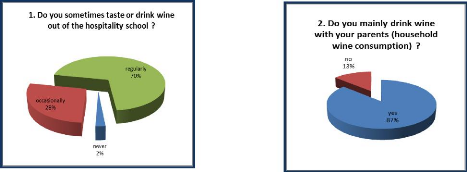
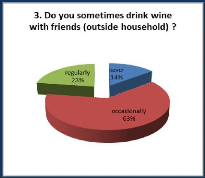
Regarding their own interest in wine (without considering their
hospitality student status) the majority (60%) consider it as important whilst
only 18% are not really interested. As highlighted above not all of them had
already made the choice of if they were going to work as a chef or as a waiter.
Those results are important as most of the teachers insist on the fact of
having wine culture as an essential aspect of the hospitality industry.
Moreover most of the great chefs are also good sommeliers and both are tightly
linked together.
While speaking about the importance of having good wine knowledge
in the field of hospitality, the percentage of students who think that wine
knowledge is an essential aspect of their job increases significantly and
reaches 86%.
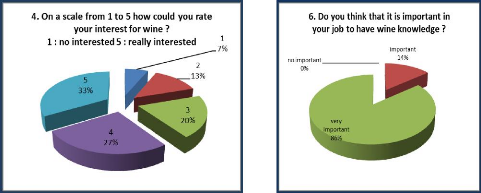
Regarding the wine course programmes it is important to underline
the high percentage of students who feel the number of hours devoted to wine
education is not enough. That can also be linked to their interest in wine
education.
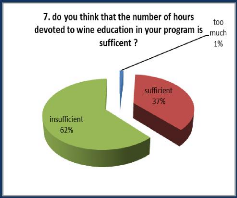
Outcomes to different questions suggested at the end of the
survey tend to reinforce the lack of wine education in student's mind. However
the most important result is that the sum of
knowledge asked through wine programmes is too high considering
the time devoted to wine education. 57% students think that there is too much
to learn in a short time. One other important aspect is the lack of practice
(wine tasting, visits to vineyards) through the
education process and that the main parts of the courses are
theoretical, which doesn't help to pick up all information. One sentence could
reflect their feelings towards wine education: not enough practice and too much
theory.
One could think that students are not ready to learn about
wine when they enter the hospitality school (the majority are about sixteen
years old). However most the students polled answered that wine courses should
be learned as soon as possible (first year).
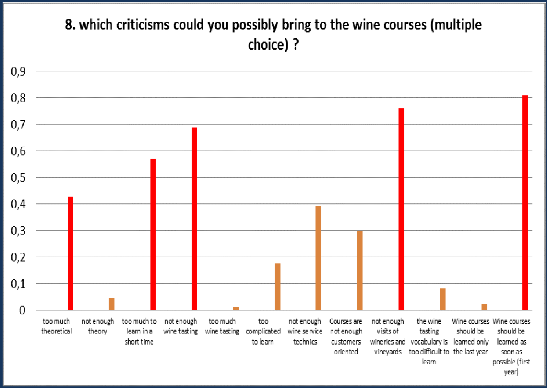
| 


